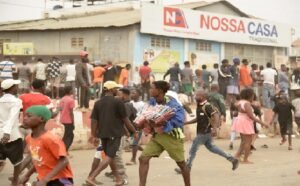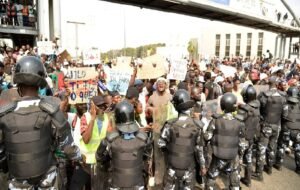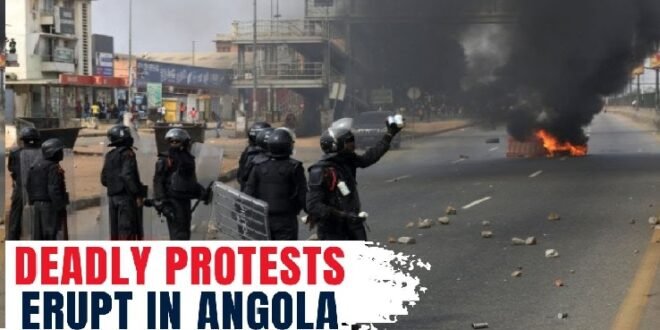01-08-2025
LUANDA: At least 32 people were killed and 197 others were injured in violence that erupted during protests against a fuel price hike this week, Angola’s government has said.
The unrest broke out on Monday when minibus taxi associations launched a three-day strike against a government decision to increase the price of diesel by one-third, part of efforts to curb costly subsidies and shore up public finances.
 Looting, vandalism and clashes with police started in the capital, Luanda, and then spread to six other provinces.
Looting, vandalism and clashes with police started in the capital, Luanda, and then spread to six other provinces.
Sporadic gunfire was heard across Luanda and several other cities on Monday and Tuesday as people looted shops and clashed with police.
President Joao Lourenco’s cabinet met on Wednesday and received an update on the security situation and police response.
A presidency statement said there had been 22 deaths, 197 people injured and 1,214 arrests. Sixty-six shops and 25 vehicles had been vandalized, and some supermarkets and warehouses looted, the statement said.
The statement added that the army was deployed to restore order as the riots “triggered a climate of widespread insecurity”.
Interior Minister Manuel Homem told reporters that a police officer was among the 22 people killed.
The streets of Luanda were tense and largely empty on Wednesday, although there were some queues outside petrol stations and some shops. There was a heavy presence of security forces.
Many shops remained closed, but public transport slowly resumed after a two-day standstill.
When the latest wave of protests began two weeks ago, Human Rights Watch accused the police of excessive force against what was a largely peaceful demonstration. Police unnecessarily fired tear gas and rubber bullets and assaulted protesters in those demonstrations, the US-based rights group said.
Angola has been gradually removing fuel subsidies since 2023, when a petrol price hike also triggered deadly protests, encouraged by the International Monetary Fund among others.
 Authorities have often been accused of clamping down harshly on protests to silence dissent in Angola, an oil-rich nation on Africa’s Atlantic coast where the People’s Movement for the Liberation of Angola party has been in power for 50 years since independence from Portugal in 1975.
Authorities have often been accused of clamping down harshly on protests to silence dissent in Angola, an oil-rich nation on Africa’s Atlantic coast where the People’s Movement for the Liberation of Angola party has been in power for 50 years since independence from Portugal in 1975.
In a joint statement Wednesday, the opposition UNITA and Bloco Democratico parties said Angola was in a “severe economic and social crisis” that was a result of government policies “disconnected from the country’s reality”.
Subsidies amounted to as much as 4 percent of gross domestic product (GDP) last year, according to the country’s finance minister.
The protests erupted on Monday in response to the government’s decision earlier this month to raise the price of diesel by 30 percent, which led to large hikes in fares by minibus taxis, an important method of transport for many Angolans.
Gunfire could be heard in central Luanda’s Cazenga area, where people were seen taking food and other items from shops.
Social media images showed clashes in the Rocha Pinto suburb near the airport, as well as in the Prenda area.
Police said in a statement on Tuesday that hundreds of arrests were made in connection with rioting, vandalism and looting of shops. Cars and buses were damaged and roads were blocked. (Int’l News Desk)
 Pressmediaofindia
Pressmediaofindia




